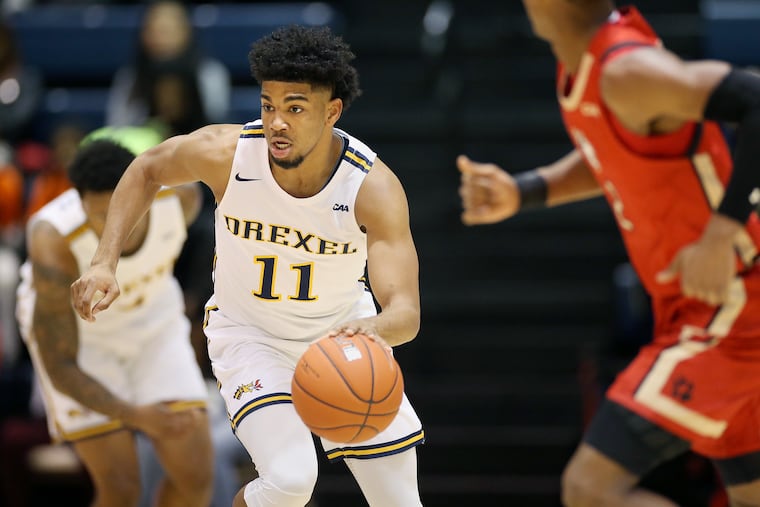City Six basketball: Drexel men picked third in CAA, while St. Joe’s and La Salle could struggle in the A-10
The Atlantic 10 and CAA commissioners spoke about Drexel, La Salle, and St. Joe's schedules. Plus, each league released preseason predictions.

The Atlantic 10 and Colonial Athletic Association each held its virtual media day for basketball Wednesday, which shed some light on what’s expected of the local teams in those conferences.
The A-10 and CAA commissioners also spoke about the safety measures, precautions, scheduling, and state of each league this season.
Here are some of the takeaways for Drexel (CAA), St. Joseph’s (A-10), and La Salle (A-10).
Preseason picks
Hop on the Drexel train if you don’t already have a seat. The Dragons received seven of 38 first-place votes and were picked third in the CAA. They were the only team to have two players make the preseason first-team All-CAA: Camren Wynter and James Butler. James Madison guard Matt Lewis beat out Wynter for preseason CAA Player of the Year.
“I think [our preseason ranking] is a reflection of the trajectory of our program,” Drexel coach Zach Spiker said. “It’s a positive thing, but we’re worried about winning as many games as possible and setting ourselves up for postseason success.”
St. Joe’s was picked 12th and La Salle 13th in the A-10 preseason poll. Hawks guard Ryan Daly, picked for the second-team A-10 preseason honors, was the lone individual player recognized from either team.
Explorers coach Ashley Howard noticed the lack of attention, but it’ll serve as motivation more than anything.
“We feel like we’re a little better than what the preseason expectations would project," he said. "But all we can control is continuing to work hard, staying safe, keeping our team healthy, and trying to become the best team we can be by March.”
Commissioners' thoughts on bubble and scheduling info
Commissioners Joe D’Antonio (CAA) and Bernadette McGlade (A-10) spoke about the changes and expectations to the altered 2020-21 season.
Neither conference is using a bubble to host regular-season games. The idea of playing conference and NCAA tournament games in bubbles has been discussed, but it doesn’t look like that will be happening in the CAA or A-10.
“We saw how well it worked for the NBA and the WNBA, but we also saw the tens of millions of dollars that it takes to control a bubble,” McGlade said. “The ability to create a bubble in the intercollegiate sense and be able to control everyone’s comings and goings just didn’t seem workable in our collegiate model.”
“It was something that we deemed to not be pragmatic as it related to a scenario associated with college student-athletes,” D’Antonio said.
Both commissioners pointed out that fan attendance is more of a local issue. Each city has its own restrictions and guidelines. Some teams aren’t able to host fans and others could bring in a limited number. St. Joe’s has already announced that it won’t host fans at the beginning of the season and season-ticket packages won’t be available.
Drexel’s conference schedule has already been announced. The CAA is using a similar format to what the Ivy League has used by playing back-to-back games on Saturday and Sundays to limit traveling.
Only one of Drexel’s nine conference opponents (Delaware) is a home-and-home. The other eight series are either two home or two away games.
“We developed this plan entirely on our own,” D’Antonio said. “This was the best way we felt as though we could control an environment for college student-athletes as it related to playing our men’s basketball games.”
The A-10 schedule is a little more spaced out. La Salle’s 18-game conference slate begins Dec. 9 against UMass and ends March 3 against Fordham.
St. Joe’s starts conference play Dec. 30 against Virginia Commonwealth and ends March 2 against Rhode Island, both at home. Both La Salle and St. Joe’s have five nationally televised games.
While the CAA packed in games on the weekend to limit travel, the A-10′s approach was to leave open windows for makeup games. Each A-10 team has two bye dates between Jan. 13 and Feb. 24, plus the weekend of March 5-7 in case of a cancellation.
“That would pertain to nonconference and conference,” McGlade said. “We’re sticking to our policy that we are not going to fill that date, and we’re going to at least preserve it through a good portion of January.”